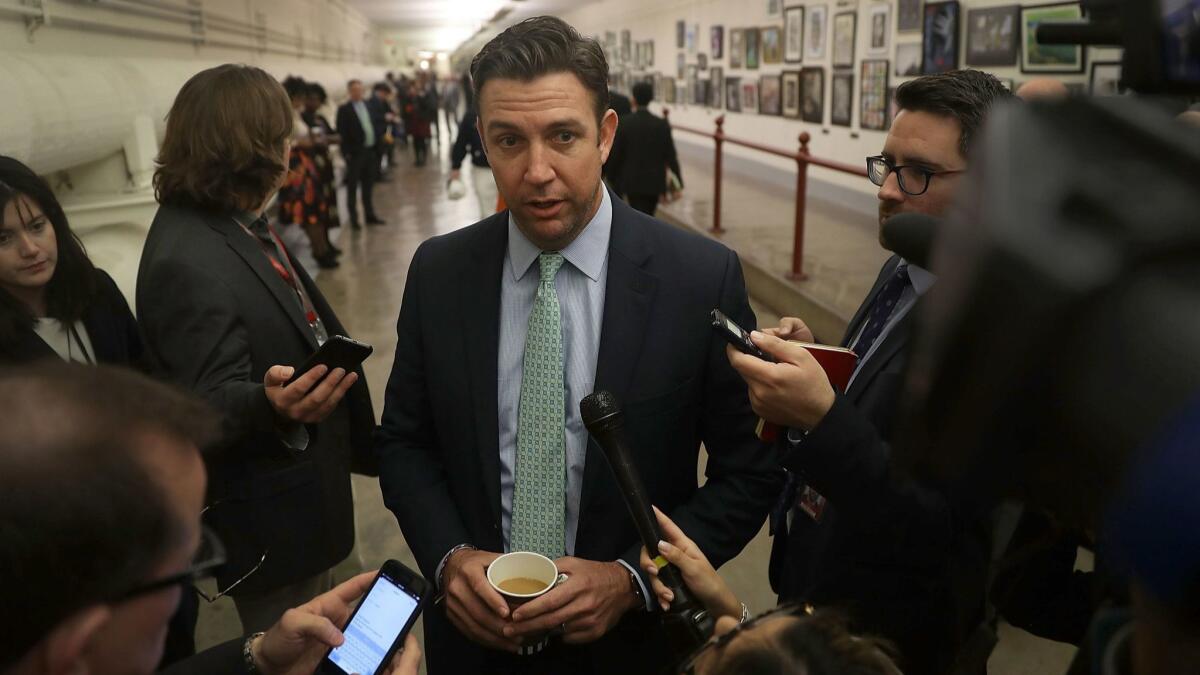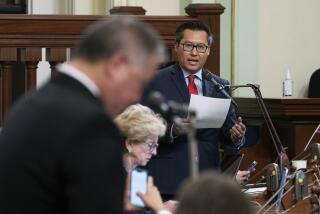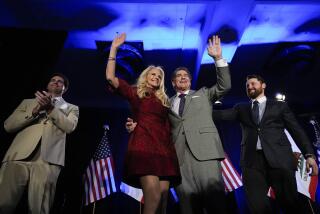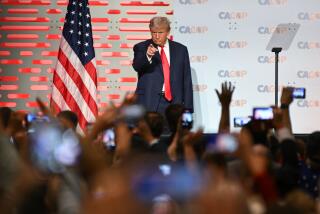Column: When California lawmakers removed write-in candidates from state and congressional ballots, it wasn’t by accident

- Share via
Two indisputable truths await the Southern California constituents of Rep. Duncan Hunter on election day in November: The indicted Republican lawmaker will remain on the ballot, and there won’t be any way for voters to write in the name of someone different.
Hunter and his wife face allegations of using campaign money to fund lavish personal expenses. Despite the charges brought against him, the GOP incumbent will face off on the Nov. 6 ballot with Democrat Ammar Campa-Najjar.
But there can be no write-in candidate in the 50th Congressional District, nor in any other state or regional race. In the early hours after Hunter’s indictment, some suggested the ban on an impromptu candidacy was perhaps an unintended consequence of California’s top-two primary system.
No, it was entirely intentional. The change was tucked deep inside a political compromise that gave birth to one of the most sweeping changes to the state’s elections.
In the hours before sunrise on Feb. 19, 2009, sleep-deprived members of the California Legislature approved a deal erasing a $41-billion budget deficit. The decisive vote was cast by a Santa Barbara GOP state Sen. Abel Maldonado after Democrats agreed to his demand for a new kind of statewide primary.
California’s major political parties feared the top-two primary but emerged as powerful as before »
Maldonado’s proposal, drafted by a bipartisan group of election reformers, would allow only the two candidates with the most votes to advance to November. Legislators placed the proposal on the June 2010 ballot.
Little noticed in the hoopla, though, was a second bill approved that night that was sold merely as a statute to implement the primary rules. It included this provision: “A person whose name has been written on the ballot as a write-in candidate at the general election for a voter-nominated office shall not be counted.”
Write-in candidates are still allowed in June primaries; they were only banned in November elections. Steve Peace, a Democrat who termed out of the Legislature in 2002, was part of the group that drafted both documents. He says reformers were not united in the decision to exclude write-in candidates.
“I disagreed with that,” Peace said Wednesday. “I think it’s the fundamental right of a voter to be able to write somebody’s name in.”
Supporters of the ban, though, worried that political party leaders would try to rush in at the last minute with a write-in candidate and a well-funded campaign to get another bite at the apple in November — injecting a third candidate into what voters had been promised would be a two-person race.
After all, Peace points out, the Democratic and Republican parties hated the top-two primary, a change he likened to “taking out the two most powerful political corporations on the planet.”
In November 2010, the last election under the old rules, there were 33 write-in candidates for California contests, including races for governor and Congress. None received more than a smattering of votes. Winning a campaign as a write-in candidate is one of the most uphill battles in all of politics.
But it does offer voters one final Hail Mary, the kind of eleventh-hour option that could be used should something happen to one of the two candidates in a race — death usually comes to mind in most hypotheticals, not so much a criminal indictment as in the case of Hunter, who is running for a sixth term in Congress.
Some, including Peace, believe the 2009 state law is unconstitutional. But there have been no takers when it comes to a lawsuit. Should that change, one key point undoubtedly will be made in court: Stripping voters of the chance to scribble in someone’s name might not have been the end of the world, but it was most certainly intentional.
Follow @johnmyers on Twitter, sign up for our daily Essential Politics newsletter and listen to the weekly California Politics Podcast
More to Read
Get the L.A. Times Politics newsletter
Deeply reported insights into legislation, politics and policy from Sacramento, Washington and beyond. In your inbox three times per week.
You may occasionally receive promotional content from the Los Angeles Times.











